By Jan Worth-Nelson
One thing was clear as a sell-out crowd lined up for their food Saturday in a big meeting room at — where else — Koegel Meats, the origin and home of the legendary frankfurter.
The coney is more than a hot dog.
The “Salute to Flint’s Coney Culture” sponsored by the Genesee County Historical Society, started with a simple formula: volunteers doling out a well-grilled dog slipped into a bun, sauce from the Starlight Diner, buns from Mr. Bread, plenty of mustard and chopped onions. Little bags of chips in a pile on a tray. Pop — Vernor’s, of course — or A&W root beer.
Emcee Gary Fisher, president of the Historical Society and host of the radio show “Fish and the Flint Chronicles,” grew up three blocks from the East Side’s legendary Angelo’s, and said for his whole life, it was his place, part of his family — like an uncle’s living room, he said.
“What you just ate has inspired art, poetry, literature, music, a couple of good brawls in the parking lot…which could be art if you were good at it, and if you lived on the East Side you better be,” Fisher declared.
To prove his point, the event featured a performance of Flint musician Dan Hall’s “Angelo’s Song,” poems by a daughter of Flint’s coney aristocracy, and a eulogy for the now gone Colonial Coney Island’s “Big Girl ” from Flint writer Connor Coyne.
Perfect Flint food — the coney line a path to simple deliciousness, both humble and cheap and also a source of local pride. No muss, No fuss.
Yes, it was about that. But it was about something else too: As Saturday’s speakers retold, it was about a history of migration, of what was brought from the old countries — Macedonia in most cases here, how those families made their way in the new country, in Flint in the early 20th Century onward.
It was, as many folks related while savoring their coneys, about the gifts those migrants and their descendants brought, the way their restaurants became hubs for life — places people had to be for breakfast, for a business lunch, for consolation after tragedy or heartbreak, for late nights after the bars closed — their restaurants places where we either felt alone and that was okay, or part of a family.
The coney island was un-selfconsciously “democratic.” In the old days at Angelo’s, you could encounter a national political figure and the neighborhood drunk on the same day, and the waitresses would treat everybody the same, Fisher fondly recalled.
What people didn’t dwell on, holding their coneys in both hands and taking big messy bites end to end, the way you do, was that the Mother Ship of Flint coneys, Angelo’s, has been closed for many years, its building at the corner of Franklin and Davison Roads falling apart.
So Saturday’s event was, undeniably, about reclaiming something that feels like it’s slipped away.
The crowd seemed to say, we can still get happy. We can still do something Flint is good at. We can still sit together at tables with paper tablecloths and paper plates and make jokes and repeat old stories and still eat coneys.
Flint is known for “cars. coneys, and athletes,” Fisher said, and “we wanted to pay homage to that — the coney island culture that it created…it was the culture that stayed with us: something uniquely Flint, it’s special.”
One of the undisputed godfathers of the Flint coney, Angelo Popoff, 88, longtime co-owner of the Mecca of coney islands bearing his name, sat smiling in a place of honor, holding court as one by one people came up to say hello and get their picture taken.
That coney island opened at the corner of Franklin and Davison in 1949.
He was not the original Angelo, Fisher explained. Angelo Nikoloff was the original “Angelo” in the name. “He died in 1969,” Fisher clarified in a follow-up email. His business partner then was “Carl Paul who joined up in 1952. He became ill and ultimately died. By then there were four other owner/partners: Angelo Branoff, Tom W. Branoff, Tom V. Branoff , and our Angelo from today, Angelo Popoff.”
Popoff said he and his partners worked 60-70 hours a week, and “took care of everybody.”
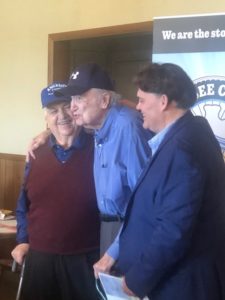
Angelo Popoff (left) with retired Flint judge Tom Yeotis and Gary Fisher (Photo by Jan Worth-Nelson)
Surviving family members and descendants from several of the “coney lineage,” the Branoffs, the Pauls, the Popoffs, the Georges were in the crowd, smiling and chuckling as speakers shared anecdotes from the old days.

Bill Ledbetter — a vegan and good sport — and Joe Johnson, both from Flint, were among the hot dog cooks and volunteer servers (Photo by Jan Worth-Nelson)
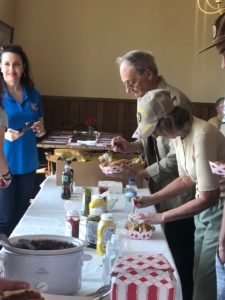
Tracy Fisher (left) with Peter and Marilyn Branoff (Photo by Jan Worth-Nelson)
Those gathering places helped shape the shared culture of this city, Fisher described, tied together with General Motors, AC Spark Plug, the neighborhoods, ups and downs of the economy, the schools, the unions, the churches. The earliest ancestors were George Brown, Sam Bryan, Steve George, and Paul Branoff, whose Flint Coney Island, thought to be the original, opened in 1919. It was tucked between two railroads downtown — a perfect location, Fisher said.
Throughout the decades, Fisher said, the history of Flint’s coney islands was, in short, a story of “the perfect food for the perfect people at the perfect time.”
“It’s an American story,” he said.
Of the coney island entrepreneurs, he said, “Their timing was impeccable — they knew the right thing to do in the right way as the Roaring Twenties swept the country.
“And then later, what better food could you have during the Great Depression than a coney? You could eat them fast, they were an easy way to feed a family.”
Soon Flint was booming with floods of people arriving in the city, not just immigrants from Europe but migrants from the South, sharecroppers, the “American arsenal of democracy,” Fisher said, “and who fed them? The coney islands…” Based on that, Fisher asserted to cheers, if it wasn’t for the coney islands of Flint, “we would not have won the Second World War!”
The boom of prosperity that ensued lasted until the late 70s, Fisher noted, but even in “thin times” the coneys kept afloat.
Describing his personal history with Angelo’s, Fisher said, “When I smelled the coney sauce today, I thought, that’s what summer smelled like to me. it was July 10, 1979, and I was on the moped and I’d finished collecting on my paper route, going to go get my ‘man dinner,’ with the Flint Journal sports section in my favorite booth..two coneys, a cheeseburger deluxe, grilled onions, order of fries and gravy, and a Coke.”
The daughter of Popoff’s partner Carl Paul, Karen Paul Holmes of Atlanta, is now a freelance writer who draws on her Flint roots for her work. I read two of her poems, “Daddy comes home from Angelo’s, Flint, Michigan” and “Sometimes we just want history to repeat.”
Here is the first poem, in its entirety:
My sister reaches into her suitcase for the chilidog sauce: a gift to me more rare than a ’59 Buick. Today in Atlanta, it’s Michigan weather, cold and dull, darkening at dinnertime, like when Daddy would arrive from work, brushing snow off his tweed coat. Once he brought us leftovers from the jukebox. In the stack of 45s, shiny as our patent leather shoes, we found Love Potion Number 9. His mustard-stained white shirt always reeked of onions spiked with cigarette smoke, grease, French fries. When he took off his sweaty shoes, Pico, our Chihuahua, rubbed her body crazily against them, then against his socks with their old potato odor. We loved the food smells at Angelo’s but not the mishmash Daddy wore home, even in his moustache and the sticky sheen of his forehead as he kneeled to our level. When Mom handed him his cold Coke, he passed it around to each kid, though five sips nearly drained the six-ounce bottle.” (from No Such Thing as Distance (Terrapin Books, 2018
Here is part of the second one:
“At Angelo’s Coney Island, Father gave customers the menu they expected and wanted again and again.
If they moved across country,
they’d send for his frankfurters and chili sauce.He and Angelo ran the place after WWII
and entered Michigan’s coney-dog wars.
News stories, even a coffee table book, recount
the ongoing clash since 1914: the Detroit-Greeks’ wet chili versus the Flint-Macedonians’ dry.
And we can almost reconstruct Dad’s secret sauce,
finely crumbled, spiced and browned beef, moist but never wet!” (poem first published, Museum of Americana, November, 2022)
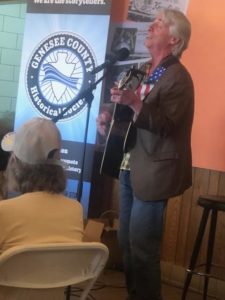
Dan Hall belts out “Angelo’s Song’ with the audience joining in (Photo by Jan Worth-Nelson)
Dan Hall, who Fisher described as “Flint’s Own Musical Minstrel,” invited the audience to sing along to his “Angelo’s Song.”

Photo and design by Tracy Fisher
“Humans are fallible because humans are hungry”
Reading from his book Atlas, Flint native author and publisher Connor Coyne shared a eulogy for the “Big Girl” statue –once a cherished landmark on Corunna Road. For decades she stood atop the now defunct Colonial Coney Island. Coyne wrote,
“You held a tray with a tasty coney island carved out of beef heart and ground up Koegels, rough and dry and red like granite, onions so fresh and wet they sparkled like diamonds, mustard of pure sunshine, the bun firm but damp with steam, a real Flint Original.”
To cheers and applause, Coyne continued, from their first arrivals, Macedonian immigrants to Flint “stirred up a dry sauce that made mouths water from Seattle to Miami and hearts flutter from Boston to San Diego.”
Mourning the Big Girl, the coney joint she represented, and perhaps summing up the essence of “coney culture,” Coyne concluded,
“I recognized your convictions that humans are fallible because humans are hungry. so you would forgive us and feed us. After all, there is plenty of pain in this world and all of our life is just one long goodbye.”
(from “Farewell, My Lovely,” in Atlas: Short Stories, Gothic Funk Press, 2015)

Flint author Connor Coyne savoring his first coney of the day (Photo by Jan Worth-Nelson)
Banner photo reproduced from brochure design by Tracy Fisher.
EVM Consulting Editor Jan Worth-Nelson can be reached at janworth1118@gmail.com.

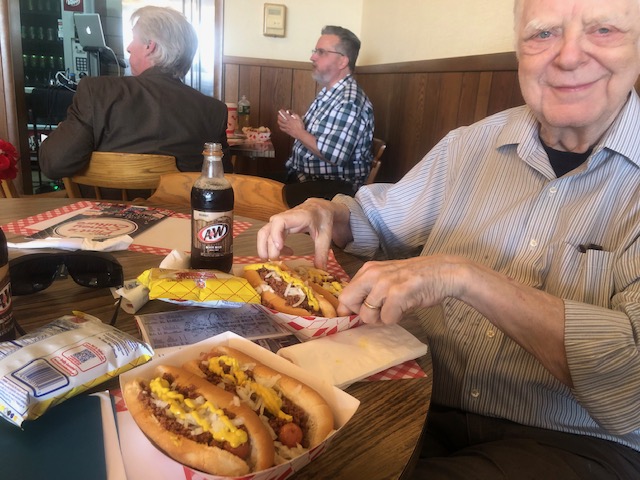
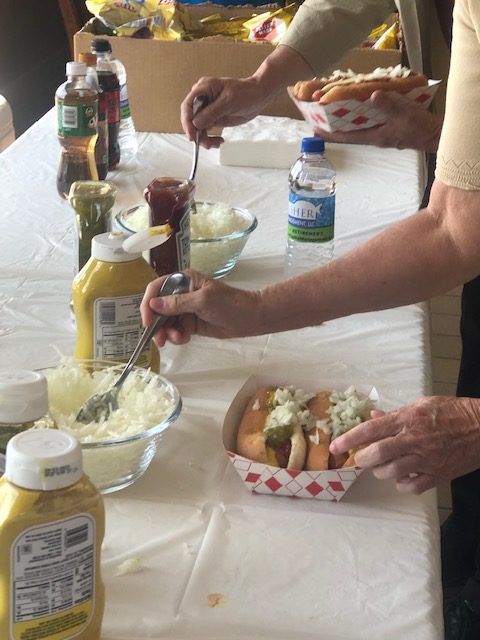

You must be logged in to post a comment.